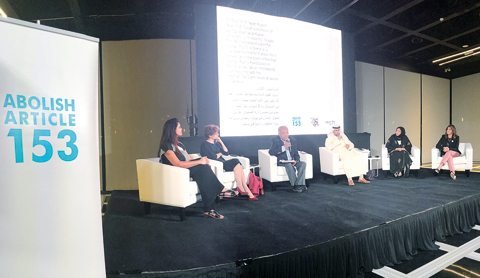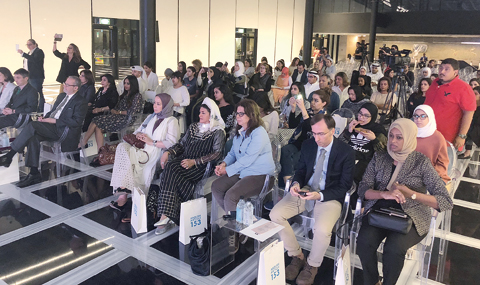Advocacy and politics, where do they meet?
 KUWAIT: Activists are hosted in a symposium organized by the Abolish 153 campaign to raise awareness on the need to address violence against women in society
KUWAIT: Activists are hosted in a symposium organized by the Abolish 153 campaign to raise awareness on the need to address violence against women in societyKUWAIT: The Abolish 153 campaign continued its awareness activities with a symposium held last Tuesday at Al-Shaheed Park, where activists gathered to discuss the topic of violence against women. The symposium, titled 'Advocacy and Politics, Where Do They Meet?' hosted four prominent figures in human and political activism from Kuwait, Saudi Arabia and Georgia, who spoke about the agony of women all over the world, citing evidence and research, as well as their praise for international action by activists to put an end to it.
The discussion was moderated by Dr Alanoud Al-Sharekh, who gave an introductory speech followed by a speech from Sundus Hussain, Abolish 153 campaign member, who explained that there is a strong trend to eliminate all forms of violence against women and young girls in the Gulf Cooperation Council (GCC). Therefore, steps should be taken by state institutions to protect women, she said.
Dr Ghanem Al-Najjar, political science professor and an International Commissioner with the Jurists in Geneva, spoke about Somalia and the issue of female circumcision there, saying: "The problem there is that no one believes that it needs to be addressed, since it is a legacy traditionally transferred across generations. We are talking about more than 90 percent of women who have been circumcised." He also emphasized that the existence of more than 60 million refugees today is an unprecedented number, and that the world is in a moral dilemma because of rape in asylum centers.
Proposal could take years before discussion in parliament
Not enough
Meanwhile, Baia Pataraia, founder of the Georgia Women's Movement, spoke of her experience of lobbying against the Georgian government to enact and enforce a law against sexual harassment. "There are not enough laws to deter such acts, and women need to feel protected by laws in order to defend themselves. Sexual harassment, due to customs and traditions, has been normalized; women are required to coexist with and accept it. This applies to all women around the globe, even in safer societies," she explained.
Kuwaiti MP Omar Al-Tabtabaie attended the symposium to show his support, saying that he along with other lawmakers want positive change to take place within society. Tabtabaie expressed appreciation to the efforts shown by the Abolish 153 campaign members in order to persuade lawmakers to put forward a draft law to repeal Article 153 of the penal code of the State of Kuwait, which states that any man who surprises his mother, sister, daughter or wife in an unsavory sexual act (zina) with a man and kills her or him or both will be treated as committing a misdemeanor punishable by a maximum of three years jail time and/or a fine of 3,000 rupees (KD 225).
Tabtabaie said however that this demand faces a problem caused by the slow mechanism in which draft laws are looked into in parliament. "It may take three years for this proposal to be the subject of discussion," said Tabtabaie. "There is a lot to change, but this change should be accompanied by the process of creating a culture of respect for those laws among members of society."
 A general view of the audience
A general view of the audienceAbsence of law
Dr Maha Al-Muneef, the regional adviser to the International League for Prevention of Child Abuse and Neglect, said: "Awareness in the Kingdom of Saudi Arabia did not surface until 2000, when the media began to highlight the issue of violence against children, because it is easier to sympathize with children, as the media strongly criticized the absence of a law that protects and provides services to the victims."
She added, "The actual action by the government and community institutions took four years. The problem is that there aren't enough studies and statistics showing the size of the problem at the stratum of the Kingdom. There are only few studies conducted in some areas, but they share similar results that indicate a large number of cases of domestic violence, which is not limited to physical abuse, but also control and deprivation of expenditure."
By Athoob Al-Shuaibi










